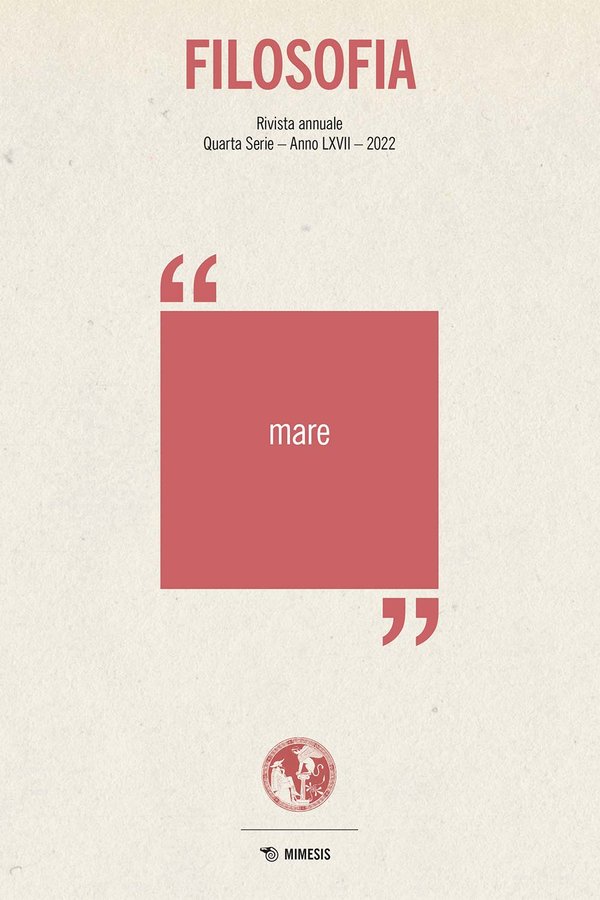Questioning Quine’s Assertion that Mass Terms like “Water” Ill-Fit the Singular/General Dichotomy
DOI:
https://doi.org/10.13135/2704-8195/7247Keywords:
Quin, mass, terms, seaAbstract
In §19 of Word and Object Quine claims that mass terms ill-fit the dichotomy between singular terms and general terms. In so doing, Quine is able to demonstrate a serious problem regarding the criteria of identity of the class of objects/‘stuff’ to which mass terms refer. Nevertheless, Quine’s account that mass terms are, in predication, ambiguous between singular/general, and that they therefore ‘ill-fit’ this dichotomy, faces several issues, and his onto- grammatical paradigm is therefore inadequate or incomplete in at least the following regards: (§2) Quine’s account of the childhood development conceptual scheme is problematically committed to Skinnerian behaviourism; (§3) mass terms are not the only type of nouns which are ambiguous between singular/general [and therefore Quine is incorrect to see this ambiguity as unique and significant]; (§4) Quine failed to distinguish, within the category of mass terms, between stuff nouns and non-stuff nouns; (§5) the artificial reduction of mass terms to singular terms belies a problematic commitment to an ontology based in first-order predicate logic and naturalized epistemology; (§6) Quine’s attachment to an object ontology gives rise to metaphysical inconsistencies, and (§7) there are merits to P.F. Strawson’s opposing theory of the singular/general division, of instantiation by feature-placing, alongside various other views which provide a solution to Quine’s problem of mass terms.
Downloads
References
Bealer, George. (1975). “Predication and Matter”. Synthese 31: 493-508.
Burge, Tyler. (1975). “Mass Terms, Count Nouns, and Change”. Synthese 31: 459-78.
Cartwright, Helen Morris. (1965). “Heraclitus and the Bath Water”. The Philosophical Review 74.4: 466-85.
Cartwright, Helen Morris. (1970). “Quantities”. The Philosophical Review 79.1: 25-42.
Chappell, V.C. (1971). “Stuff and Things”. Proceedings of the Aristotelian Society 71.1: 61-76.
Cowie, Fiona. (2008). “Innateness and Language”. The Stanford Encyclopedia of Philosophy. Edited by Edward N. Zalta: https://plato.stanford.edu/entries/innateness-language/.
Ding N., Melloni L., Zhang H., Tian X., Poeppel D. (2016). “Cortical Tracking of Hierarchical Linguistic Structure in Connected Speech”. Nature Neuroscience 19.1: 158-64.
Grandy, Richard. “Stuff and Things”. (1975). Synthese 35: 479-85.
Hacker, P.M.S. (1979). “Substance: The Constitution of Reality”. Midwest Studies in Philosophy, 4.1: 239-61.
Laycock, Henry. (2021). “Being Without Borders: Towards a Metachemistry of Substances”. Unpublished manuscript, Queen’s University: 1-42.
Laycock, Henry. “Some Questions of Ontology”. (1972). The Philosophical Review 81.1: 3-42.
Laycock, Henry. “Theories of Matter”. (1975). Synthese 31.3: 45-60.
Marschark M., Siple P., Lillo-Martin D., Campbell R., Everhart V. (1997). Relations of Language and Thought: The View from Sign Language and Deaf Children. Oxford: Oxford University Press.
Oller D., Wieman L., Doyle W., and Ross C. (1975). “Infant Babbling and Speech”. Child Language 3.1: 1-11.
Parsons, Terence. “An Analysis of Mass Terms and Amount Terms”. (1970). Foundations of Language 6.3: 362-88.
Quine, W.V.O. (1957). “Speaking of Objects”. Proceedings and Addresses of the American Philosophical Association 31.0: 5-22.
Quine, W.V.O. (1961). From A Logical Point of View. United States of America: Harvard University Press.
Quine, W.V.O. (2013). Word and Object: New Edition. Massachusetts: The MIT Press.
Strawson, P.F. (1996). Individuals. London and New York: Routledge.
Strawson, P.F. (1953-1954). “Particular and General”. Proceedings of the Aristotelian Society, 54.0: 233-60.
Tardif, Twila, Paul Fletcer, Weilan Liang, Zhixiang Zhang, Niko Kaciroti. (2008). “Baby’s First 10 Words”. Developmental Psychology 44.4: 928-38.
Xu, Fei. (2009). “Count Nouns, Sortal Concepts, and the Nature of Early Words”. In Kings, Things, and Stuff: Mass Terms and Generics. Edited by Francis Jeffry Pelletier. Oxford: Oxford University Press.



